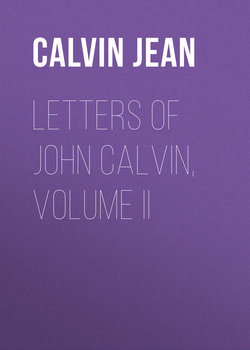Читать книгу Letters of John Calvin, Volume II - Calvin Jean, Jean Calvin - Страница 6
CXLIX. – To Viret
ОглавлениеDispersion of the School at Geneva – contests at Neuchatel on the subject of church property – Calvin's opinion of Farel
24th October 1545.
We shall wait until you either restore Francis to us, or send Erasmus. As, meanwhile, the school is dispersed,8 you must make haste. If both of these courses appear to you tedious, or attended with difficulty, briefly signify so to us; for I will send for a person from Strasbourg, who, in my opinion, will be suitable, although I would rather have taken one from this quarter. With regard to the assistant-teacher, I do not venture upon anything, because it will be more satisfactory that the person who has the superintendence of the school shall have the unfettered power of selecting whom he chooses.
I had excused myself to Farel, but he remains fixed in his purpose.9 It would not only be ridiculous, but bordering on imprudence, to undertake to correct in the Neuchatelese a vice which here we are not able to cure. I had given it as my advice, that it would be better to draw up a memorial, in which the Princes should promise that they would be always ready to make restitution, if an agreement could be come to regarding legitimate administration. In the next place, I advised them, under this pretext, to put a stop to those profane alienations, in order that the matter might be left undecided until a more favourable time. Farel replies, that the authority of the Princes will not avail much. What confidence then will our letter produce? He further urges me to enter into communication with Bucer, in order to obtain from the Council of Strasbourg a letter to the Council of Berne to this purport: – That it had been pointed out to them that the Neuchatelese did very wrong in squandering the goods of the Church; and that it was the duty of the Bernese to check this license. He hopes that a letter of that nature would also do good at Berne. I, on the contrary, hardly think that the people of Strasbourg would write such a letter, as they would be afraid of increasing the sore. In the next place, if they should write, do we not know that their admonition would be laughed at? And, although the Bernese were in the highest degree desirous to remedy this fault of the Neuchatelese, with what face could they set about it? I have to implore that they will not venture to reprehend in others that which they pertinaciously defend as lawfully done by themselves. I may therefore say of Farel what Cicero said of Cato, "That he acts indeed with good judgment, but in counsel does not always shew the best." The cause of this is chiefly, that being carried away by the vehemence of his zeal, he does not always discern what is expedient, and either does not foresee dangers, or despises them; and there is to be added the evil, that he cannot bear with patience those who do not comply with his wishes. But what could I do? for I will not be induced to undertake anything which I think will be of injurious tendency.
Christopher will tell you about Champereau,10 and I will write when the matter has come to an end. Adieu, most excellent brother, and most sincere friend. I have not yet had an opportunity of meeting Amédée. I will, however, fulfil your commission. – Adieu, again, including your wife, aunt, and brothers. The co-presbyters, my wife, and the neighbours respectfully salute you. – Yours,
John Calvin.
[Lat. copy – Library of Geneva. Vol. 111.]
8
The plague had dispersed the regents and students of the College of Geneva, and Calvin was labouring at the re-organization of that establishment. He had already proposed to the Council, in March 1545, to call to Geneva the celebrated Maturin Cordier, as president of the regents; but this proposal ended in nothing, and Maturin Cordier remained at Lausanne.
9
Farel was then at strife with the Seigneury of Neuchatel, on the subject of the administration of ecclesiastical property.
10
Rebuked on the ground of his morals, this minister had been banished to a country parish, and having refused to submit to the entire Consistory, he had received his dismissal.
